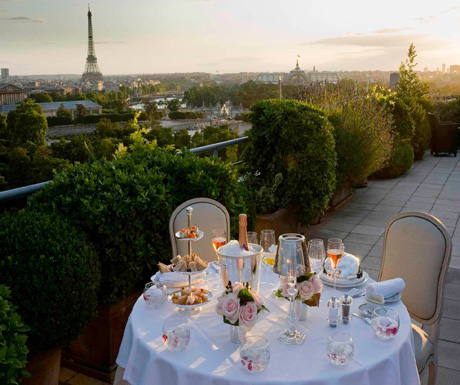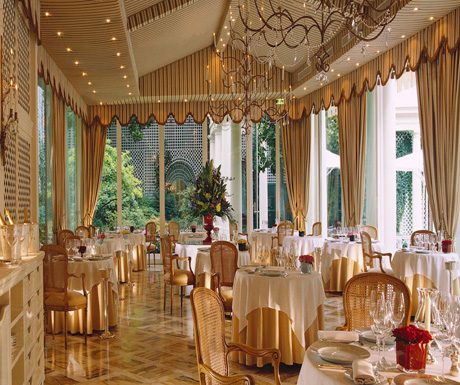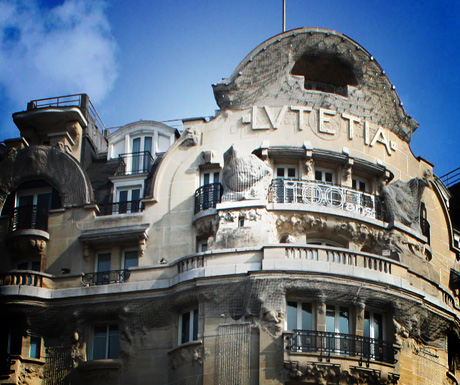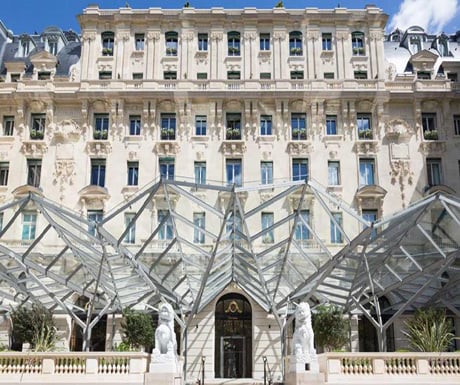Accommodation · Europe · France · Hotels · Regions · Western Europe
The top 4 historical hotels in Paris
Many hotels are established in buildings originally conceived for different purposes: private mansions, conference centres, apartment blocks, etc. One such example is the Shangri-La, the five-star palace that used to be the private mansion of Roland Bonaparte, Napoleon IIIs nephew. Yet Parisian hotels are often rebuked for the small rooms they offer their guests. This is not a matter of wanting to displease the client, however; it is simply rare for these hotels to have been designed to accommodate visitors, meaning that the rooms in the reconverted buildings are rarely as large as guests might hope. We cant choose their size and space. Paris historical hotels are a dying breed, and many of them are palaces with the advantage of having been created for the purpose of accommodating holiday-makers and business travellers. They have therefore been designed and built in such a way as to make guests feel welcome and offer them the most pleasant and spacious stay possible. Here is a non-exhaustive run-down.
The Meurice
The Meurice was created by Augustin Meurice in 1771. Originally, it was an inn for English tourists in Calais. Its goal was to provide them a place in mainland France that was every bit as luxurious as what they were used to back home. During the Restoration, a hotel opened at 223 Rue Saint Honoré, Paris that introduced a brand new style of hotel management: everything was designed to make life easier for the travelling guest. The hotel moved to Rue de Rivoli in 1835 and has remained there to this day. One of its most famous residents was Miss Howard, Napoleon IIIs mistress.
 At the start of the 20th century, the Meurices management changed. Arthur Million, the owner of Café de la Paix and one of the hotels major shareholders, called upon Frédéric Schwenter, a great Swiss hotel manager, to help him develop an establishment capable of competing with the Ritz, which had opened in 1898. At the instigation of these two men, the Meurice was enlarged by adding the Hôtel Métropole. The hotel was completely rebuilt, apart from the listed façades. The rooms were fitted with modern equipment for maximum comfort (bathrooms, telephone, etc.). A lift inspired by Marie Antoinette of Austrias sedan chair was also added.
In the 2000s, the hotel underwent an extensive renovation project and now boasts on its website that each room and suite is a spacious, peaceful oasis of calm, providing guests with the ultimate in luxury.
The Bristol
Frederick-Augustus Hervey, the fourth Earl of Bristol and one of the most colourful characters of the 18th century, was a great traveller. He also gained quite a reputation for his ultra-materialistic theories. He was not the founder of the Parisian palace of the same name: the hotel, which opened its doors in 1925, adopted the Earls name to honour him and the traveller he represented.
At the start of the 20th century, the Meurices management changed. Arthur Million, the owner of Café de la Paix and one of the hotels major shareholders, called upon Frédéric Schwenter, a great Swiss hotel manager, to help him develop an establishment capable of competing with the Ritz, which had opened in 1898. At the instigation of these two men, the Meurice was enlarged by adding the Hôtel Métropole. The hotel was completely rebuilt, apart from the listed façades. The rooms were fitted with modern equipment for maximum comfort (bathrooms, telephone, etc.). A lift inspired by Marie Antoinette of Austrias sedan chair was also added.
In the 2000s, the hotel underwent an extensive renovation project and now boasts on its website that each room and suite is a spacious, peaceful oasis of calm, providing guests with the ultimate in luxury.
The Bristol
Frederick-Augustus Hervey, the fourth Earl of Bristol and one of the most colourful characters of the 18th century, was a great traveller. He also gained quite a reputation for his ultra-materialistic theories. He was not the founder of the Parisian palace of the same name: the hotel, which opened its doors in 1925, adopted the Earls name to honour him and the traveller he represented.
 The luxury rooms and the suites are all wonderful gems of pure Parisian style, where all the charm of the Roaring Twenties is encapsulated in an elegantly moulded, modern style. One can also admire a selection of absolutely splendid 18th-century furniture. Over the course of the hotels history, its various owners have all embraced the same tradition of joyful, exuberant materialism.
The hotels current owners, the Oetker family, has continued to extend it with recent additions including a French-style garden and a luxury spa. The hotel has 128 spacious, light-filled rooms and suites in an authentic 18th-century style. One of the most famous is the Penthouse suite, which offers views of the whole of Paris and measures no less than 200m2.
The Lutetia
Although this famous hotel closed its doors recently for renovations, a quick leaf through its history will show us that it was originally created by its founder to provide the ideal accommodation conditions to tourists stopping over in the city. Madame Boucicaut, the owner of the Bon Marché, decided in 1910 to order the construction of a large hotel where her customers could be accommodated near her business. Nothing was too grand for Madame Boucicaut, who wished to offer her guests only the finest conditions for their stay in Paris. The hotel was conceived by architects Louis-Charles Boileau and Henri Tauzin in an Art Nouveau style with the first Art Deco bar in Paris and decorated with a number of sculptures by artists Léon Binet and Paul Belmondo.
The luxury rooms and the suites are all wonderful gems of pure Parisian style, where all the charm of the Roaring Twenties is encapsulated in an elegantly moulded, modern style. One can also admire a selection of absolutely splendid 18th-century furniture. Over the course of the hotels history, its various owners have all embraced the same tradition of joyful, exuberant materialism.
The hotels current owners, the Oetker family, has continued to extend it with recent additions including a French-style garden and a luxury spa. The hotel has 128 spacious, light-filled rooms and suites in an authentic 18th-century style. One of the most famous is the Penthouse suite, which offers views of the whole of Paris and measures no less than 200m2.
The Lutetia
Although this famous hotel closed its doors recently for renovations, a quick leaf through its history will show us that it was originally created by its founder to provide the ideal accommodation conditions to tourists stopping over in the city. Madame Boucicaut, the owner of the Bon Marché, decided in 1910 to order the construction of a large hotel where her customers could be accommodated near her business. Nothing was too grand for Madame Boucicaut, who wished to offer her guests only the finest conditions for their stay in Paris. The hotel was conceived by architects Louis-Charles Boileau and Henri Tauzin in an Art Nouveau style with the first Art Deco bar in Paris and decorated with a number of sculptures by artists Léon Binet and Paul Belmondo.
 Today, the hotel contains 231 rooms including 60 suites with an Art Deco feel, such as the Eiffel, Literary and Parisian themed suites, not forgetting the Arman and David Lynch suites decorated by the artists themselves. The hotel also has two restaurants and a bar.
The Peninsula
Formerly the Palais de Castille, the building served as Queen Isabella II of Spains home for 36 years in the second half of the 19th century. At the start of the 20th century, the building was demolished by Leonard Tauber to make way for the construction of Hotel Majestic under Sibiens architectural direction. The establishment, which contained 400 rooms, opened its doors in 1908 and quickly became one of the leading hotels of Belle Epoque Paris. After being bought by the government in 1936, the buildings were used for various purposes until 2007, when the Katara Hospitality group purchased them and set about creating Hotel Peninsula. The hotel has been undergoing renovations since 2010 and reopened to the public on 1 August this year.
Today, the hotel contains 231 rooms including 60 suites with an Art Deco feel, such as the Eiffel, Literary and Parisian themed suites, not forgetting the Arman and David Lynch suites decorated by the artists themselves. The hotel also has two restaurants and a bar.
The Peninsula
Formerly the Palais de Castille, the building served as Queen Isabella II of Spains home for 36 years in the second half of the 19th century. At the start of the 20th century, the building was demolished by Leonard Tauber to make way for the construction of Hotel Majestic under Sibiens architectural direction. The establishment, which contained 400 rooms, opened its doors in 1908 and quickly became one of the leading hotels of Belle Epoque Paris. After being bought by the government in 1936, the buildings were used for various purposes until 2007, when the Katara Hospitality group purchased them and set about creating Hotel Peninsula. The hotel has been undergoing renovations since 2010 and reopened to the public on 1 August this year.
 Of course, this list is non-exhaustive especially that I decided to focus on hotels and palaces renowned for their luxury accommodation.
Didier Moinel Delalande is a Director at Hotel Mathurin.
If you would like to be a guest blogger on A Luxury Travel Blog in order to raise your profile, please contact us.
Of course, this list is non-exhaustive especially that I decided to focus on hotels and palaces renowned for their luxury accommodation.
Didier Moinel Delalande is a Director at Hotel Mathurin.
If you would like to be a guest blogger on A Luxury Travel Blog in order to raise your profile, please contact us.
 At the start of the 20th century, the Meurices management changed. Arthur Million, the owner of Café de la Paix and one of the hotels major shareholders, called upon Frédéric Schwenter, a great Swiss hotel manager, to help him develop an establishment capable of competing with the Ritz, which had opened in 1898. At the instigation of these two men, the Meurice was enlarged by adding the Hôtel Métropole. The hotel was completely rebuilt, apart from the listed façades. The rooms were fitted with modern equipment for maximum comfort (bathrooms, telephone, etc.). A lift inspired by Marie Antoinette of Austrias sedan chair was also added.
In the 2000s, the hotel underwent an extensive renovation project and now boasts on its website that each room and suite is a spacious, peaceful oasis of calm, providing guests with the ultimate in luxury.
The Bristol
Frederick-Augustus Hervey, the fourth Earl of Bristol and one of the most colourful characters of the 18th century, was a great traveller. He also gained quite a reputation for his ultra-materialistic theories. He was not the founder of the Parisian palace of the same name: the hotel, which opened its doors in 1925, adopted the Earls name to honour him and the traveller he represented.
At the start of the 20th century, the Meurices management changed. Arthur Million, the owner of Café de la Paix and one of the hotels major shareholders, called upon Frédéric Schwenter, a great Swiss hotel manager, to help him develop an establishment capable of competing with the Ritz, which had opened in 1898. At the instigation of these two men, the Meurice was enlarged by adding the Hôtel Métropole. The hotel was completely rebuilt, apart from the listed façades. The rooms were fitted with modern equipment for maximum comfort (bathrooms, telephone, etc.). A lift inspired by Marie Antoinette of Austrias sedan chair was also added.
In the 2000s, the hotel underwent an extensive renovation project and now boasts on its website that each room and suite is a spacious, peaceful oasis of calm, providing guests with the ultimate in luxury.
The Bristol
Frederick-Augustus Hervey, the fourth Earl of Bristol and one of the most colourful characters of the 18th century, was a great traveller. He also gained quite a reputation for his ultra-materialistic theories. He was not the founder of the Parisian palace of the same name: the hotel, which opened its doors in 1925, adopted the Earls name to honour him and the traveller he represented.
 The luxury rooms and the suites are all wonderful gems of pure Parisian style, where all the charm of the Roaring Twenties is encapsulated in an elegantly moulded, modern style. One can also admire a selection of absolutely splendid 18th-century furniture. Over the course of the hotels history, its various owners have all embraced the same tradition of joyful, exuberant materialism.
The hotels current owners, the Oetker family, has continued to extend it with recent additions including a French-style garden and a luxury spa. The hotel has 128 spacious, light-filled rooms and suites in an authentic 18th-century style. One of the most famous is the Penthouse suite, which offers views of the whole of Paris and measures no less than 200m2.
The Lutetia
Although this famous hotel closed its doors recently for renovations, a quick leaf through its history will show us that it was originally created by its founder to provide the ideal accommodation conditions to tourists stopping over in the city. Madame Boucicaut, the owner of the Bon Marché, decided in 1910 to order the construction of a large hotel where her customers could be accommodated near her business. Nothing was too grand for Madame Boucicaut, who wished to offer her guests only the finest conditions for their stay in Paris. The hotel was conceived by architects Louis-Charles Boileau and Henri Tauzin in an Art Nouveau style with the first Art Deco bar in Paris and decorated with a number of sculptures by artists Léon Binet and Paul Belmondo.
The luxury rooms and the suites are all wonderful gems of pure Parisian style, where all the charm of the Roaring Twenties is encapsulated in an elegantly moulded, modern style. One can also admire a selection of absolutely splendid 18th-century furniture. Over the course of the hotels history, its various owners have all embraced the same tradition of joyful, exuberant materialism.
The hotels current owners, the Oetker family, has continued to extend it with recent additions including a French-style garden and a luxury spa. The hotel has 128 spacious, light-filled rooms and suites in an authentic 18th-century style. One of the most famous is the Penthouse suite, which offers views of the whole of Paris and measures no less than 200m2.
The Lutetia
Although this famous hotel closed its doors recently for renovations, a quick leaf through its history will show us that it was originally created by its founder to provide the ideal accommodation conditions to tourists stopping over in the city. Madame Boucicaut, the owner of the Bon Marché, decided in 1910 to order the construction of a large hotel where her customers could be accommodated near her business. Nothing was too grand for Madame Boucicaut, who wished to offer her guests only the finest conditions for their stay in Paris. The hotel was conceived by architects Louis-Charles Boileau and Henri Tauzin in an Art Nouveau style with the first Art Deco bar in Paris and decorated with a number of sculptures by artists Léon Binet and Paul Belmondo.
 Today, the hotel contains 231 rooms including 60 suites with an Art Deco feel, such as the Eiffel, Literary and Parisian themed suites, not forgetting the Arman and David Lynch suites decorated by the artists themselves. The hotel also has two restaurants and a bar.
The Peninsula
Formerly the Palais de Castille, the building served as Queen Isabella II of Spains home for 36 years in the second half of the 19th century. At the start of the 20th century, the building was demolished by Leonard Tauber to make way for the construction of Hotel Majestic under Sibiens architectural direction. The establishment, which contained 400 rooms, opened its doors in 1908 and quickly became one of the leading hotels of Belle Epoque Paris. After being bought by the government in 1936, the buildings were used for various purposes until 2007, when the Katara Hospitality group purchased them and set about creating Hotel Peninsula. The hotel has been undergoing renovations since 2010 and reopened to the public on 1 August this year.
Today, the hotel contains 231 rooms including 60 suites with an Art Deco feel, such as the Eiffel, Literary and Parisian themed suites, not forgetting the Arman and David Lynch suites decorated by the artists themselves. The hotel also has two restaurants and a bar.
The Peninsula
Formerly the Palais de Castille, the building served as Queen Isabella II of Spains home for 36 years in the second half of the 19th century. At the start of the 20th century, the building was demolished by Leonard Tauber to make way for the construction of Hotel Majestic under Sibiens architectural direction. The establishment, which contained 400 rooms, opened its doors in 1908 and quickly became one of the leading hotels of Belle Epoque Paris. After being bought by the government in 1936, the buildings were used for various purposes until 2007, when the Katara Hospitality group purchased them and set about creating Hotel Peninsula. The hotel has been undergoing renovations since 2010 and reopened to the public on 1 August this year.
 Of course, this list is non-exhaustive especially that I decided to focus on hotels and palaces renowned for their luxury accommodation.
Didier Moinel Delalande is a Director at Hotel Mathurin.
If you would like to be a guest blogger on A Luxury Travel Blog in order to raise your profile, please contact us.
Of course, this list is non-exhaustive especially that I decided to focus on hotels and palaces renowned for their luxury accommodation.
Didier Moinel Delalande is a Director at Hotel Mathurin.
If you would like to be a guest blogger on A Luxury Travel Blog in order to raise your profile, please contact us.Did you enjoy this article?
Receive similar content direct to your inbox.


They look like aristocratic hotels from centuries ago, I wonder if they’re as expensive as things used to be back then!
My friends and I are big fans of Peninsula hotels. Glad they’ve finally opened one in Paris (and by the look of it, it might be the best of them all). Looking forward to experiencing it in a few months.